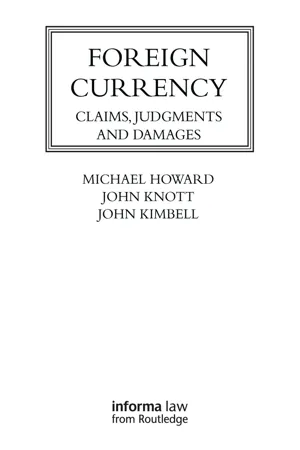
- 354 pages
- English
- ePUB (mobile friendly)
- Available on iOS & Android
About this book
Currency fluctuation, currency wars and even potential currency collapse (the Euro, the Bitcoin) are all risks that commercial parties must consider and guard against.
This book gathers together in one volume all the information and advice practitioners are likely to need when advising on, advancing or defending claims involving a foreign currency element.
The determination of the proper currency (or currencies) of a claim often has a dramatic effect on the level of a court judgment or arbitration award that is ultimately obtained. It is, therefore, vital for practitioners to accurately assess claims which involve a foreign currency element.
The authors guide the reader through the legal principles governing how foreign currency claims are treated in English law. The book covers both the treatment of foreign currency in substantive law as well as such procedural matters as how to claim interest correctly on a foreign currency claim and how to plead, prove or disprove the applicability of a particular currency.
This book is an invaluable and essential resource for all lawyers involved in international commerce, but will be of particular interest to those engaged in international finance, commodity transactions, international shipping and transport, and the insurance of assets and liabilities abroad.
"Those who practise in this country need guidance in navigating the tricky waters that The Despina R unleashed. This excellent book provides that guidance."
The authors " have been uniquely well placed to meet the challenge of analysing what is a perplexing body of jurisprudence, and to suggest principled answers to currency issues that have not yet been the subject of judicial decision. They consider not merely claims in contract and tort, but every type of claim that might raise an issue in relation to a foreign currency."
The Rt Hon. The Lord Phillips of Worth Matravers, KG, PC,
President of the Supreme Court of the United Kingdom, 2009-2012
Frequently asked questions
- Essential is ideal for learners and professionals who enjoy exploring a wide range of subjects. Access the Essential Library with 800,000+ trusted titles and best-sellers across business, personal growth, and the humanities. Includes unlimited reading time and Standard Read Aloud voice.
- Complete: Perfect for advanced learners and researchers needing full, unrestricted access. Unlock 1.4M+ books across hundreds of subjects, including academic and specialized titles. The Complete Plan also includes advanced features like Premium Read Aloud and Research Assistant.
Please note we cannot support devices running on iOS 13 and Android 7 or earlier. Learn more about using the app.
Information
Chapter 1
Introduction
Overview
- In what circumstances and, subject to what conditions, does an English court permit a claim to be advanced in a foreign currency?
- Does the claimant have a free choice as to the currency in which to express his claim?
- If the defendant objects to the choice of a foreign currency by the claimant, how should the court decide?
- Does a defendant to a foreign currency claim have the right to tender payment in sterling, and, if so, how is the date and rate of exchange to be determined?
- Is the choice of currency always a matter for the lex fori or does the law applicable to the obligation in question have a role?
- What happens if a claim is advanced in one currency and the defendant counterclaims in another currency?
- Is it possible to make a claim, say, in tort in one currency and a claim in contract (or restitution) arising out of the same facts in a different currency?
- What is the appropriate interest rate for a claim expressed in one or more foreign currencies?
When the principles relating to claims in foreign currency really matter
The old law (pre-Miliangos)
Exceptions to the ‘breach-date’ rule prior to Miliangos
The decision in Miliangos
Table of contents
- Cover
- Half Title
- Title
- Copyright
- Dedication
- Contents
- Foreword
- Preface
- Table of cases
- Table of legislation
- Table of orders, regulations and rule
- Chapter 1 Introduction
- Chapter 2 Basic concepts
- Chapter 3 Sterling: its historical role, and the decline that led to a change in the law
- Chapter 4 The euro zone
- Chapter 5 The change in English law introduced by Miliangos and its forebears
- Chapter 6 Contract
- Chapter 7 Tort
- Chapter 8 Restitution and unjust enrichment
- Chapter 9 The law of trusts and fiduciaries
- Chapter 10 Claims against limited or common funds
- Chapter 11 Set-off
- Chapter 12 Interest
- Chapter 13 Are currency exchange losses recoverable as damages?
- Chapter 14 Procedure and evidence
- Chapter 15 Fiat money, legal tender and alternative money
- Index